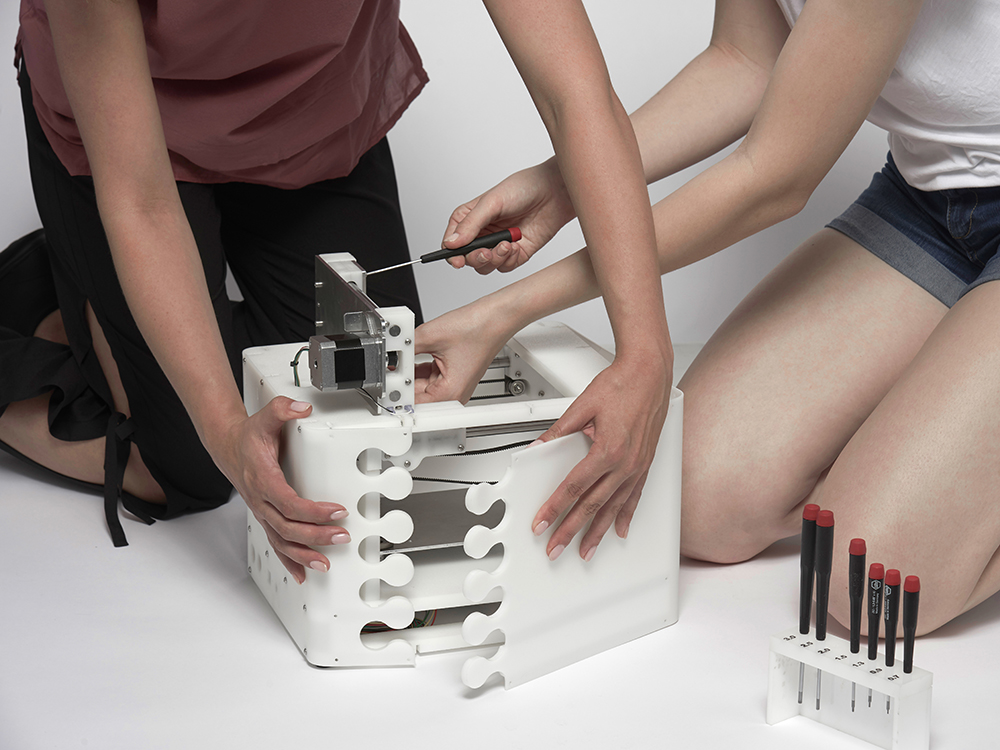Among the ray guns and fictional planets that make up the 1950s futurism of Baltimore’s Lost City Diner sits Harrison Tyler. With slightly disheveled, dirty blond hair and wire-rimmed glasses, Tyler’s earnestness and professional demeanor belie his 23 years.
Tyler, along with partner Evan Roch, operate jimmi research, a Baltimore-based 3D printer company that also runs workshops on how to build and maintain the devices. It’s a unique trajectory for two individuals with sculpture degrees from the Maryland Institute College of Art (MICA).
“It started in Intro to Digital Fabrication at MICA,” said Tyler. The course turned their arts education into something else.
For now at least (more on that later), the guys behind jimmi are part of the growing ranks of Baltimore maker — tinkerers and designers toying with 3D printing and other technologies that are democratizing the world of manufacturing.
https://vimeo.com/119491082
For Tyler and Roch’s commencement show, they presented their first 3D printer. Immediately after the show they were invited by MICA professor Ryan Hoover to run their first workshop.
“It was a crash course in micro-manufacturing,” Tyler recalled. “It was crazy and super stressful, but we were hooked on that.”
The jimmi model is simple: Tyler and Roch manufacture the pieces required to build a 3D printer and then host workshops where participants pay for the printer parts and to learn how to build, use, modify and maintain their new machines.
I’m hoping that this up-and-coming design community will be as great and as big as the arts community here.
Since the initial workshop a year ago, jimmi has hosted three more in Maryland and one in Florida, where Tyler went to high school. Each workshop has been an opportunity to test the newest iteration of their printer. Through this process, the pair have garnered insight into what they suspect is a sustainable business model.
Neither Tyler or Roch are Maryland natives, though Tyler likes the idea of building jimmi in Baltimore.
“I feel like there is something brewing in Baltimore around the design community,” he said. “I’m hoping that this up-and-coming design community will be as great and as big as the arts community here.”
Tyler also fawns over the low cost of living and cheap studio space that Baltimore offers. However, as they build out their business plan, they are looking for very specific support.
“For everything that we need, which includes business advice and fabrication facilities, there is nowhere that embodies everything,” Tyler said.
Currently, Tyler and Roch are part-time employees at MICA’s Digital Fabrication Studio. This allows them access to the tools they need to manufacture printer parts. However, these yearlong positions run out soon and with it access to the lab.
For the pair, purchasing a $50,000 laser cutter is out of the question, and they are not enamored with their local choices. Tyler laments that the options he’s seen are not cost effective nor are they built for scaling.
When asked about the value of the coming maker spaces in Baltimore, like Open Works, Tyler was visibly excited. “We’d go there in a heart beat,” Tyler said of the massive new makerspace coming to Station North. “That would be perfect for us. It’s the most affordable way for us to get access to the machines we need.”
Unfortunately, Open Works is about a year a way from operating and that doesn’t work for their project’s timeline. Tyler rues their current moment. “It’s frustrating, we have to jump through a lot of hoops to find any solutions right now.”
Even with those frustrations, jimmi continues to host new workshops, here and in other states. If it can continue to grow as part of Baltimore’s swelling maker movement remains to be seen.








